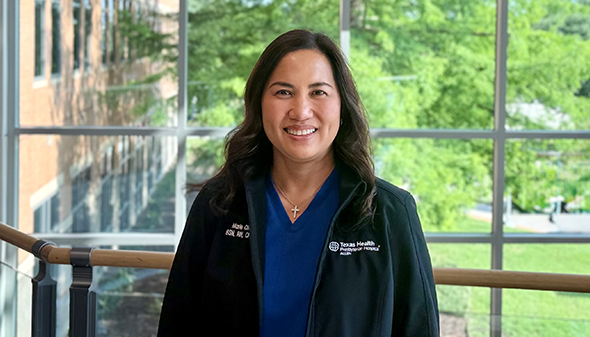Marie Chua, B.S.N., R.N., CPAN, was caring for end-stage renal and post-kidney transplant patients in her home country of the Philippines when a life-altering event led her down a different path.
“When my husband got sick in 2000, we came to the United States to seek treatment, and that sparked my interest to apply for a job here,” Chua said. “When we went back to the Philippines, I started my U.S. application process, which took almost three years.”
In 2004, Chua and her family were able to move to the United States, and soon after, she joined Texas Health Resources.

She started in the medical-surgical unit at Texas Health Presbyterian Hospital Allen, then transferred to Texas Health Presbyterian Hospital Dallas. Chua eventually returned to Texas Health Allen to work in day surgery and the post-anesthesia care unit, where she now specializes solely in post-anesthesia care.
Inspired to make a difference
Chua’s mother, a retired nurse, cared for neighbors and worked at medical missions. Her work motivated her daughter to take the opportunity to directly make a difference in patients’ lives. Chua recalls an experience of her own that had a profound impact.
“We had a frightened patient in need of emergent open-heart surgery. His biggest wish was to have his son, who was serving in the U.S. Navy, by his side,” Chua said. “The house supervisor and I coordinated with a naval officer to ensure the patient’s son was flown in just in time to be with his father before his surgery.”
New skills through NCAP
In addition to bringing care and compassion to her work, Chua was interested in continuing to develop her clinical skills. Encouraged by her peers, Chua joined the Nursing Career Advancement Program (NCAP). The NCAP program is intended for direct care registered nurses to obtain additional recognition while advancing their educational, clinical and professional skills.
Chua now sees NCAP as an invaluable opportunity for bedside nurses to elevate their careers and receive financial incentives.
“I obtained my certified post-anesthesia nurse [CPAN] certification so I can move up to NCAP Level IV,” Chua said. “I learned new skills, like assisting anesthesiologists with nerve blocks, and I’ve been trained in ultrasound-guided IV insertions, making me a resource for my hospital for ‘hard-stick’ patients.”
Chua’s advice to new nurses? “Find meaning in what you do so you can give great care to your patients. Grow and advance your career while you’re still young. Start by joining NCAP.”
published

